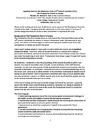Exercising Your “Will Power”
Will power: the strength of will to carry out one’s decisions, wishes or plans.
When we think of “will power,” we normally think of the character trait that enables us to persevere through trials and temptations to achieve our goals. Without a measure of will power, most of our personal goals would never be accomplished. There is another form of will power which is just as essential for achieving our goals: the power of our Last Will and Testament.

Your Last Will and Testament
Your Last Will and Testament, puts into writing how you would like to distribute your assets after your death. A legal will enables you to exercise your “Will Power” and ensures that your wishes for your family and other beneficiaries are accomplished. An Angus Reid poll found that almost half of respondents had not created a will, which is the foundation of any estate plan. Without a proper will in place, the government decides how your estate will be distributed –and the government has already decided that you will leave nothing for charity.
If you want to make a charitable bequest of any kind, it is absolutely essential to have a legal will. Through your will, you can ensure that the ministries you have supported throughout your lifetime are adequately funded for future generations.
Changing Your Will
If you already have a will in place, you don’t have to change your entire will in order to add the church as a beneficiary. Usually, all you need to do is to add a clause (codicil) to your existing will, stating your intentions. Codicils, like wills, must be dated and signed, and your signature must be witnessed.
Tax Benefits and Considerations
When you make a bequest to the church or other charity, your estate is eligible to receive a donation receipt for the full value of your bequest. The executer for your estate can then claim a tax credit for up to 100% of the net income on your final tax return. Any unused credits can be applied against your previous year’s income, again up to 100% of your net income. This means that you can make a significant charitable gift, and your estate and heirs will reap the tax benefits of your generosity.
While it is important for your will to express your philanthropic intentions, it should not be too rigidly or narrowly worded. Bequests have been known to tie the hands of the church and make it difficult to make full use of the gift.
If you make a designated bequest for a specific ministry, you should give the session or the appropriate leadership the authority to change the designation to a similar type of ministry if the ministry you had designated becomes obsolete or no longer needs funding.

Seek the services of a qualified estate lawyer to
ensure your bequest is set up properly.
When making a bequest to a congregation, be sure to include the specific name and address of the congregation (there are a lot of congregations named St. Andrew’s in The Presbyterian Church in Canada!).
Sample Will Language for a Legacy Gift
(These are sample clauses only. Your lawyer or estate planner should review any wording.)
Undesignated:
If it is your wish that your bequest benefit the total work of the church, then your designation should state: “My trustees shall deliver, pay or transfer (a specific amount, % or the residue) of my estate to The Presbyterian Church in Canada, Presbyterians Sharing.”
A bequest to a specific congregation should read: “My trustees shall deliver, pay or transfer (a specific amount, % or the residue) of my estate to the (name of congregation) Congregation of The Presbyterian Church in Canada, (address of congregation), or, if such congregation does not exist at the time of my death, to The Presbyterian Church in Canada.”
Designated:
“My trustees shall deliver, pay or transfer (a specific amount, % or residue) of my estate to (full name and address of congregation – or its successor ‐ or The Presbyterian Church in Canada or full legal name of the ministry you want to support), to be used for (list purpose, program, ministry). In the event that circumstances make the specific use of this gift no longer practical or desirable, the Board of Trustees of (name of the congregation – or its successor ‐ or The Presbyterian Church in Canada or name of the ministry area) is hereby authorized to make changes in its use consonant with the spirit and general interest of the gift.”
If you want to designate your bequest for a particular area of ministry, then you can use a clause such as: “To The Presbyterian Church in Canada, the sum of $ , with the request that it be used to assist theological education/new church development/international mission work/etc.” If you do intend to designate a Legacy Gift to a specific area of the church, please contact us to obtain the best language to use.
Residual contingent trust:
“Upon the death of the survivor of my (wife, husband, etc.) ________________________ and my (son, daughter, etc.) _________________________, my trustee shall deliver, pay or transfer the residue of my Estate, including any undistributed income to (full name and address of congregation – or its successor ‐ or The Presbyterian Church in Canada or full legal name of the ministry you want to support) to be used for any purpose(s) approved by the Board of Trustees of (name of the congregation – or its successor ‐ or The Presbyterian Church in Canada or name of the ministry area).“
Powers of Attorney and Personal Directives
Along with your Will, you may want one or more Powers of Attorney documents. A Power of Attorney is a legal document in which you give someone you trust the right to make decisions for you if something happens and you are no longer able to look after matters on your own. In Canada, the word “attorney” does not mean “lawyer,” it means someone appointed to represent another, or to act in their place.
Each province treats powers of attorney differently. A power of attorney may simply be called a personal directive in your province or territory. In most provinces, there is one document authorizing a person to make decisions about your financial affairs and another document authorizing a person to manage your health care decisions.
Even though your attorney can make decisions for you when circumstances dictate, there are boundaries your attorney has to abide by. Your attorney cannot: make or change your last will and testament, change the beneficiaries of your life insurance plan, or transfer your power of attorney to someone else.
Regardless of your age or state of health, it is wise to prepare powers of attorney and/or personal directive documents when you make or update your will.
For more information on powers of attorney, visit https://www.canada.ca/en/employment-social-development/corporate/seniors/forum/power-attorney-financial.html
Resources
Learn more about Estate Planning:

Charitable
Bequests
Webpage

Will
Planning
Workbook
For More Information
The Stewardship & Planned Giving staff are available to help you turn your philanthropic wishes into reality.
To learn how a charitable bequest or other planned gift can leave a lasting legacy, please contact us
Charitable Registration No. 10785 6619 RR0001
The information on this page does not constitute legal or professional advice and should not be substituted for appropriate professional advice. The Presbyterian Church in Canada strongly recommends that you seek professional legal and financial advice to ensure your financial situation and those of your dependents are considered; that your tax situation is reviewed; and that your legacy gift is tailored to your circumstances.


